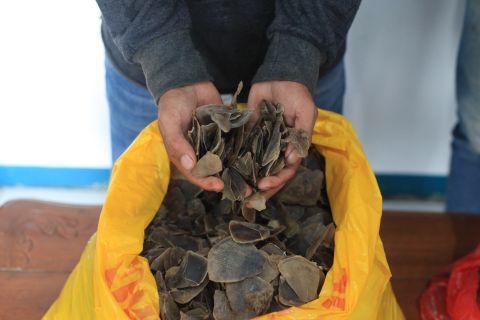
We have applauded the Quick Reaction Forest Police Unit (SPORC) in West Borneo for arresting two poachers trading in pangolin scales (Manis javanica) The pair, initials PD, 25 years old and JN, 27 years old, caught red-handed in Nanga Pinoh, Melawi district, West Borneo on 22 May 2018. The successful undercover operation resulted in the confiscation of 9.45 kilograms of pangolin scales. Both men were apprehended in a local restaurant in Nanga Pinoh while they were waiting for their buyer to arrive. SPORC had received information about the time and place of the deal from a member of the local community. The person suspected of being the buyer, initials BD, is still on the run and SPORC believe that BD is part of a pangolin trading syndicate in West Borneo which is targeting international markets in Asia such as Vietnam and China.

According to Section Head of Law Enforcement Department Region III West Kalimantan David Muhammad, the two poachers confessed to obtaining the pangolin scales by hunting in the forest near their village in Seruyan Hulu, Central Borneo. They admitted that for the past three years they had been hunting pangolins in the forest at night. They would ride motorbikes and use hunting dogs to track them down and catch them.
PD and JN captured and killed the pangolins for both meat and scales. They kept the meat for their own consumption and the scales were for trading. They were intending to sell the scales for IDR 3,2 million (USD $228, £171) per kilogram.
Based on the evidence, both men were detained in Prison House Class 2A in Pontianak, West Borneo for hunting, keeping, exploiting and trading in pangolins. They had both violated Section 5 of the 1990 Law on Conservation of Natural Resources and Ecosystems. Article 21 Paragraph (2) letter D. Article 40 paragraph (2) states that hunting, keeping, exploiting and trading pangolins carries a sentence of five years in prison and IDR 100 million maximum fine (USD 7147).

Based on undercover police investigations in the field, it is believed that the poaching was part of a crime syndicate which stretched from sub-district hunters to district and regional dealers, all the way to international dealers who export the animal products to Asian countries such as Vietnam and China.
David Muhammad, Section Head of Law Enforcement Department Region III West Kalimantan, said: “We will [investigate] deep into this crime web to search for other trading networks. They are collecting about 8-9 kilograms of scales per week and dozens of kilograms every month to supply a district dealer.”

Karmele Llano Sanchez, our Programme Director in Indonesia, said: “We applaud the police on the arrest of these two individuals. The illegal trade in pangolins is both extremely cruel and responsible for decimating numbers in the wild. The illegal wildlife trade is pushing entire species to the brink of extinction.
The trade is motivated by the greed of people who seek to keep, eat and exploit wild animals and their products. We simply can’t allow this to happen. It’s up to all of us to stop the trade in wildlife before we erase all these beautiful animals from the face of the earth. Moreover, this trade is not only putting animals at risk, it also presents a threat to human health, with many zoonotic diseases originating from habits related to wildlife consumption and trade.”
Adam Miller, Executive Director, Planet Indonesia-USA, said: “The sheer size and volume of the pangolin trade is nothing but a global tragedy. Organised crime groups adapt quickly to exploit shortcomings in law enforcement agencies and capitalise on government corruption. Pangolins represent yet another species pushed to the edge of extinction as a result of the human thirst for wildlife products. It will take a global effort of stakeholders from local communities to top-level government agencies to save this amazing species from extinction.”
PHOTO CREDIT - SPORC: The Quick Reaction Forest Police Unit (SPORC) Brigade Bekantan of the Law Enforcement Department of the Ministry of Environment and Forestry Region III West Kalimantan (Gakkum KLHK).

